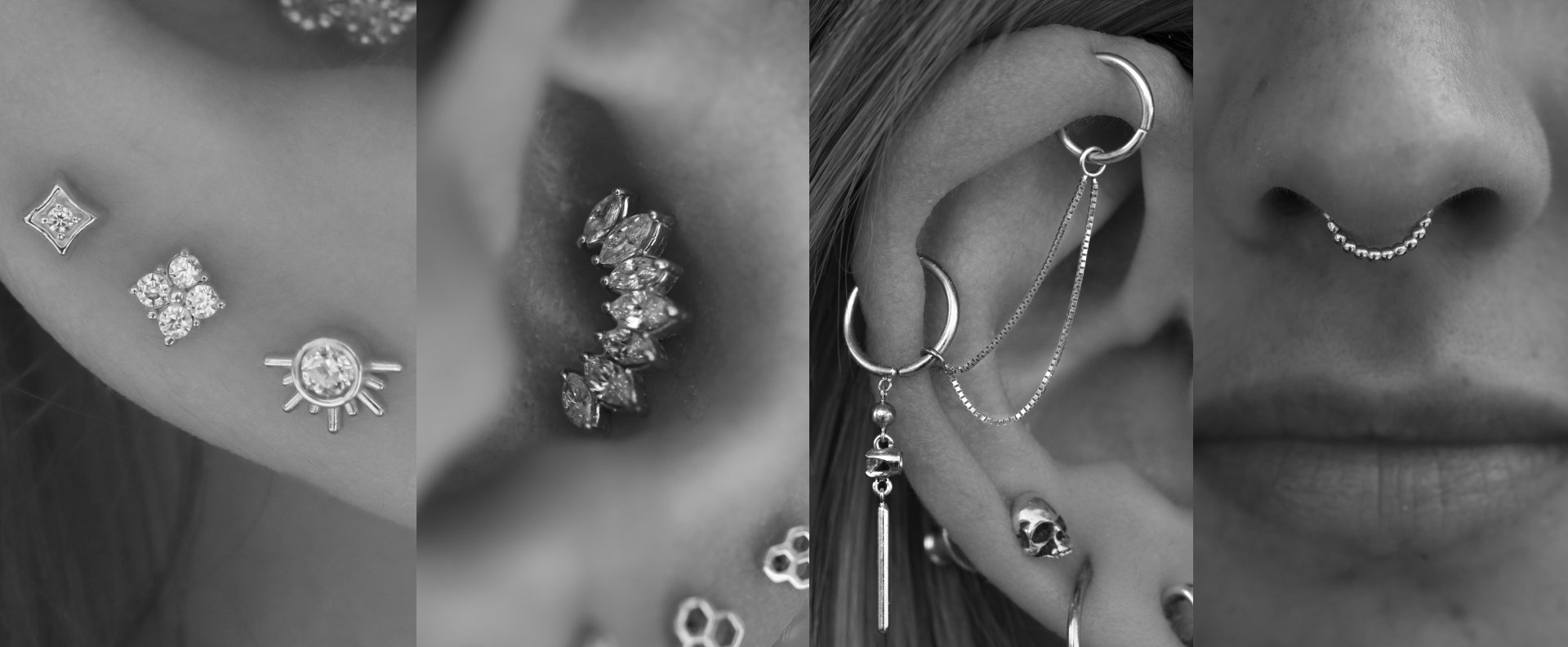Frequently asked questions.
Your Questions Answered.
BEFORE YOU GET PIERCED
-
Lifestyle, overall health, extracurricular activities, and the level of commitment you are willing to make to aftercare and healing are all important factors to consider before getting a new piercing.
-
One of the best tools we have available for research now is social media! It’s important to look for a piercer with pictures of new and healed work in their portfolios. All body art studios should have a business license and a health permit posted in a conspicuous place. The piercing studio should look clean and tidy, and it should be free of dust and debris. It’s good to have a piercer that carries medical implant-grade jewelry and makes themselves available for consultations and troubleshooting.
-
A reputable piercer will carry medical implant-grade jewelry, have an autoclave with spore tests and sterilization records available, and be willing to discuss healing, aftercare, advise on placement, and continue ongoing education. As piercers, we are forever learning!
THE PIERCING PROCESS
-
You can expect your piercer to ask you for your preferred placement as well as tell you why it will or will not work for you, and if not, they will make a recommendation for something they think will work better! They should confirm placement with you and talk you through the procedure as they go, so you always know what's going on.
-
Of course everyone's pain tolerance is different, and everyone experiences piercings differently. More often than not, a skilled piercer will leave you with a quick pinch or pressure during the piercing process. Experience can vary based on several factors.
-
Initial jewelry style varies by anatomy and placement! Some piercings heal best with a stud, but piercings like daiths and septums heal better with appropriately sized rings! Navels and eyebrows typically do best with curved barbells.
AFTERCARE AND HEALING
-
Most piercings just require irrigation daily to rinse away excess debris and bacteria, and to be kept clean, dry, and protected from trauma to best heal.
-
Signs of infection are purulent discharge, heat and pain radiating from the piercing site, excessive swelling, and feeling unwell or feverish. If you suspect infection, seek professional medical care as soon as possible, and follow up with your piercer.
-
Initial healing time varies depending on tissue type and placement, but most piercings take a year to fully heal and be stable.
-
You can absolutely bathe and shower in clean water following being pierced! You want to avoid large natural bodies of water such as lakes, oceans, and rivers. You also want to avoid shared bodies of water, such as pools and hot tubs. If you find yourself in this situation and cannot abstain, do your best to keep your head above water, and if the piercing becomes submerged or gets wet, don’t panic! Flush the piercing with saline or clean water as soon as possible and monitor the piercing for signs of infection.
LIVING WITH PIERCINGS
-
Once a day is typically adequate! We usually suggest making piercing aftercare part of your shower routine, so it becomes second nature to care for your healing piercing. If you skip a shower day, no big deal! Your body produces scabs that protect you from debris and bacteria, as long as they stay intact.
-
The answer to this varies and you always want a professional to assist with changing the jewelry. Downsizing for most piercings we recommend 6-8 weeks, for oral piercings we recommend 2-4 weeks. At this time, we can also change the decorative portion of the jewelry. For most piercings to be able to change your jewelry comfortably from our style to your own we recommend 6-9 months if everything is healing well.
-
Go see a professional to check it out! If you're struggling to get jewelry in but you feel like the piercing should be open, we have special tools that can assist us with inserting the jewelry!
SOLVING COMMON ISSUES
-
Piercing bumps are caused by trauma, pressure, and friction! If you have a piercing bump, come see a professional piercer so we can assist. Based on the placement, consistency, and appearance of the bump, we can help determine the nature of the issue with the piercing and assist you with healing.
-
Allergies manifest in different ways, but are commonly seen as red, weeping, and peeling skin around the piercing site. The skin can sometimes also appear to “pull” away from the piercing, creating a crater-like shape around the opening of the piercing site.
-
Definitely go see your piercer! We can assist with safe removal and guide you on aftercare.
MAKING CHANGES AND REMOVAL
-
We always suggest seeing a professional! Stretching piercings in small increments in an aseptic environment is recommended because, when stretching piercings, it creates micro-tears in the piercing channel.
-
In many cases, yes! We always suggest a consult with your piercer before proceeding, so that they can feel and visually inspect the proposed piercing site and make sure the area is healthy and ready to be repierced.
LEGAL AND AGE RESTRICTION
-
This varies depending on the state and county you are in! Our studio offers earlobe piercings to adults and children as young as 5 years old. Helix piercings (rim of ear) are offered to clients ages 13yrs and older. Facial, ear and navel piercings are offered to clients ages 14 yrs and older. All other piercings are offered to clients 18yrs and older. For more information on what is required for minors click here.

Ready to get pierced?
Book your appointment today!